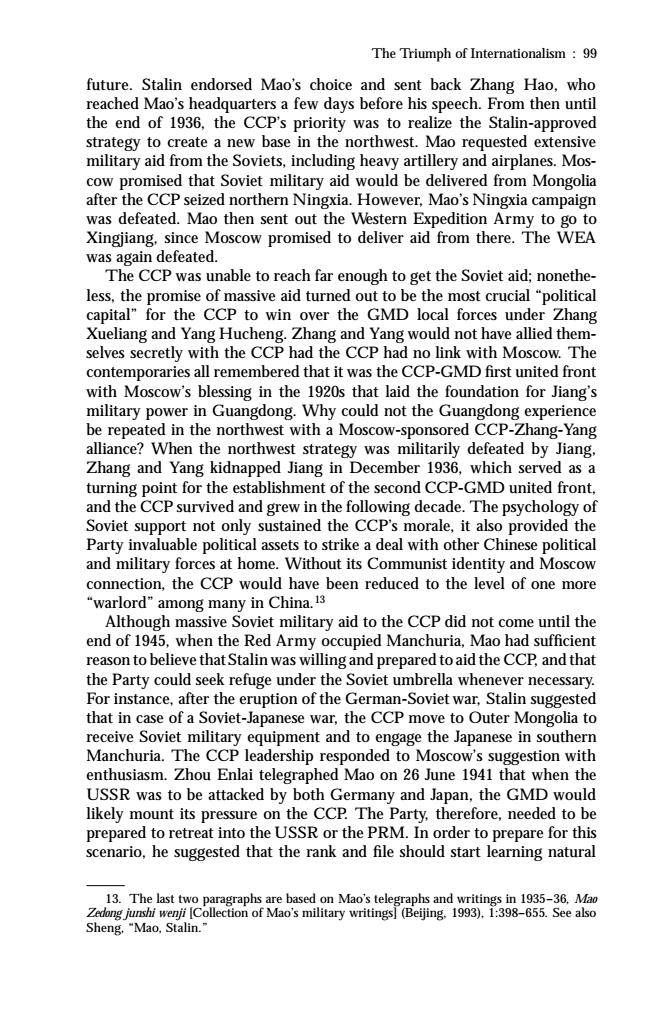正在加载图片...

The Triumph of Internationalism 99 future.Stalin endorsed Mao's choice and sent back Zhang Hao,who reached Mao's headquarters a few days before his speech.From then until the end of 1936,the CCP's priority was to realize the Stalin-approved strategy to create a new base in the northwest.Mao requested extensive military aid from the Soviets,including heavy artillery and airplanes.Mos- cow promised that Soviet military aid would be delivered from Mongolia after the CCP seized northern Ningxia.However,Mao's Ningxia campaign was defeated.Mao then sent out the Western Expedition Army to go to Xingjiang.since Moscow promised to deliver aid from there.The WEA was again defeated. The CCP was unable to reach far enough to get the Soviet aid;nonethe- less,the promise of massive aid turned out to be the most crucial "political capital"for the CCP to win over the GMD local forces under Zhang Xueliang and Yang Hucheng.Zhang and Yang would not have allied them- selves secretly with the CCP had the CCP had no link with Moscow.The contemporaries all remembered that it was the CCP-GMD first united front with Moscow's blessing in the 1920s that laid the foundation for Jiang's military power in Guangdong.Why could not the Guangdong experience be repeated in the northwest with a Moscow-sponsored CCP-Zhang-Yang alliance?When the northwest strategy was militarily defeated by Jiang. Zhang and Yang kidnapped Jiang in December 1936,which served as a turning point for the establishment of the second CCP-GMD united front, and the CCP survived and grew in the following decade.The psychology of Soviet support not only sustained the CCP's morale,it also provided the Party invaluable political assets to strike a deal with other Chinese political and military forces at home.Without its Communist identity and Moscow connection,the CCP would have been reduced to the level of one more “warlord'”among many in China.ls Although massive Soviet military aid to the CCP did not come until the end of 1945,when the Red Army occupied Manchuria,Mao had sufficient reason to believe that Stalin was willing and prepared to aid the CCP,and that the Party could seek refuge under the Soviet umbrella whenever necessary. For instance,after the eruption of the German-Soviet war,Stalin suggested that in case of a Soviet-Japanese war,the CCP move to Outer Mongolia to receive Soviet military equipment and to engage the Japanese in southern Manchuria.The CCP leadership responded to Moscow's suggestion with enthusiasm.Zhou Enlai telegraphed Mao on 26 June 1941 that when the USSR was to be attacked by both Germany and Japan,the GMD would likely mount its pressure on the CCP.The Party,therefore,needed to be prepared to retreat into the USSR or the PRM.In order to prepare for this scenario,he suggested that the rank and file should start learning natural 13.The last two paragraphs are based on Mao's telegraphs and writings in 1935-36,Mao Zedong junshi wenji [Collection of Mao's military writings](Beijing.1993).1:398-655.See also Sheng."Mao,Stalin."The Triumph of Internationalism : 99 future. Stalin endorsed Mao’s choice and sent back Zhang Hao, who reached Mao’s headquarters a few days before his speech. From then until the end of 1936, the CCP’s priority was to realize the Stalin-approved strategy to create a new base in the northwest. Mao requested extensive military aid from the Soviets, including heavy artillery and airplanes. Moscow promised that Soviet military aid would be delivered from Mongolia after the CCP seized northern Ningxia. However, Mao’s Ningxia campaign was defeated. Mao then sent out the Western Expedition Army to go to Xingjiang, since Moscow promised to deliver aid from there. The WEA was again defeated. The CCP was unable to reach far enough to get the Soviet aid; nonetheless, the promise of massive aid turned out to be the most crucial “political capital” for the CCP to win over the GMD local forces under Zhang Xueliang and Yang Hucheng. Zhang and Yang would not have allied themselves secretly with the CCP had the CCP had no link with Moscow. The contemporaries all remembered that it was the CCP-GMD first united front with Moscow’s blessing in the 1920s that laid the foundation for Jiang’s military power in Guangdong. Why could not the Guangdong experience be repeated in the northwest with a Moscow-sponsored CCP-Zhang-Yang alliance? When the northwest strategy was militarily defeated by Jiang, Zhang and Yang kidnapped Jiang in December 1936, which served as a turning point for the establishment of the second CCP-GMD united front, and the CCP survived and grew in the following decade. The psychology of Soviet support not only sustained the CCP’s morale, it also provided the Party invaluable political assets to strike a deal with other Chinese political and military forces at home. Without its Communist identity and Moscow connection, the CCP would have been reduced to the level of one more “warlord” among many in China.13 Although massive Soviet military aid to the CCP did not come until the end of 1945, when the Red Army occupied Manchuria, Mao had sufficient reason to believe thatStalin was willing and prepared to aid the CCP, and that the Party could seek refuge under the Soviet umbrella whenever necessary. For instance, after the eruption of the German-Soviet war, Stalin suggested that in case of a Soviet-Japanese war, the CCP move to Outer Mongolia to receive Soviet military equipment and to engage the Japanese in southern Manchuria. The CCP leadership responded to Moscow’s suggestion with enthusiasm. Zhou Enlai telegraphed Mao on 26 June 1941 that when the USSR was to be attacked by both Germany and Japan, the GMD would likely mount its pressure on the CCP. The Party, therefore, needed to be prepared to retreat into the USSR or the PRM. In order to prepare for this scenario, he suggested that the rank and file should start learning natural 13. The last two paragraphs are based on Mao’s telegraphs and writings in 1935–36, Mao Zedong junshi wenji [Collection of Mao’s military writings] (Beijing, 1993), 1:398–655. See also Sheng, “Mao, Stalin